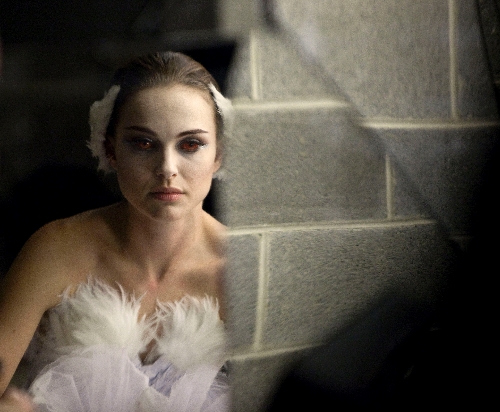‘Black Swan’ offers moments of brilliance despite obvious, pedestrian plot

It’s easy to get right to the pointe in "Black Swan."
After all, the movie focuses on a dancer drawn to the dark side. (All the better to get into character as "Swan Lake’s" Swan Queen, my dears.)
But there’s a vast difference between getting to the pointe and getting to the point — and that’s a divide "Black Swan" can’t always conquer, no matter how hard it tries. And my, how it tries.
Director Darren Aronofsky simply knows no other way.
From "The Wrestler" to "Requiem for a Dream," Aronofsky loves to put his characters through the ringer — psychological or physical, preferably both — as his protagonists struggle with, and ultimately surrender to, the ecstasy of agony.
This time, Aronofsky’s cinematic fever dream focuses on young ballerina Nina (Natalie Portman), a New York dancer dreaming of winning the leading role in a new production of "Swan Lake."
If you don’t know "Swan Lake," never fear — the ballet troupe’s Svengali-like artistic director Thomas (Vincent Cassel) explains it all for you, setting the stage for the movie’s crazy-mirror reflections of characters and conflicts.
As Thomas observes, Nina’s perfect for the role of "Swan Lake’s" virginal White Swan, who literally dies for love, thanks to her delicate appearance and precise technique.
There’s just one problem: Whoever gets the role of the Swan Queen also has to portray the duplicitous, wanton Black Swan. It’s a role Nina will never be able to understand, Thomas warns, unless she gets in touch with her darker impulses.
That’s a particularly daunting prospect for someone who, even offstage, is such a good girl — one who still lives at home, sleeps in her frilly little-girl bedroom and allows herself to be smothered by her self-righteous, self-sacrificing mother (a bewitchingly witchy Barbara Hershey).
Good thing Mom doesn’t know Nina vomits up her birdlike meals and scratches her alabaster skin until it bleeds in her endless quest for perfection.
Because "Black Swan" is all about dual roles and divided souls, Nina naturally has alternative paths to follow as she struggles to prove herself a worthy Swan Queen. (Hail, hail, the doppelganger’s all here.)
The company’s dying swan of a prima ballerina (played, in a particularly cruel case of crash-and-burn life imitating art, by Winona Ryder) presents one daunting example. And live-wire Lily (smilingly calculating Mila Kunis), a new troupe member who’s as wild as Nina is mild, could turn out to be a real friend. (It would never occur to Nina that Lily might be one of those keep-your-enemies-close types, secretly trying to steal the starring role for herself.)
Little wonder that Nina winds up dancing dangerously close to the edge as her on- and offstage lives converge — and, perhaps, collapse.
If all this sounds more than a bit lurid, welcome to Aronofsky’s nightmare.
It’s a nightmare that smacks of too many other filmmakers’ visions. (Roman Polanski and David Lynch, among others, kept dancing in my head as Aronofsky put "Black Swan" through its tortured-artist paces.)
Or maybe it’s just that the screenplay (by "Wrestler" co-producer Mark Heyman, Andres Heinz and John J. McLaughlin, from Heinz’s story) remains so crushingly pedestrian, so glaringly obvious throughout. When "Black Swan" begins, Nina’s already unbalanced; by the time she’s ready to take the stage as the Swan Queen, her grasp of reality has taken a swan dive as she prepares to obliterate herself for her art.
We know what’s coming, all too well. Yet despite its lack of psychological depth, "Black Swan" serves up moments of undeniable surface brilliance.
Reunited with cinematographer Matthew Libatique (who shot Aronofsky’s "Pi," "Requiem for a Dream" and "The Fountain"), the director conjures images that dance between the horrible and the hypnotic as "Black Swan" surrenders to its own excesses.
Portman, fortunately, isn’t one of them.
"Black Swan" may surround Nina with all sorts of torments, but Portman manages to balance her character’s drive with an aching vulnerability that (partially) grounds the movie’s flights of overblown fancy. And while her dancing is reasonably convincing, it’s not quite impressive enough to dazzle — another reminder that Nina can never be perfect enough, especially in her own hypercritical eyes.
In my hypercritical eyes, however, "Black Swan’s" nothing we haven’t seen before, and (too) many times at that.
While watching, there were times when Tchaikovsky’s classic score almost faded away, replaced — in my mind, at least — by the all-too-appropriate title of that rueful old Peggy Lee favorite, "Is That All There Is?"
Contact movie critic Carol Cling at ccling@reviewjournal.com or 702-383-0272.